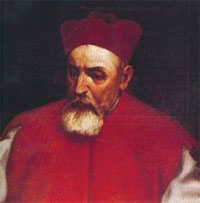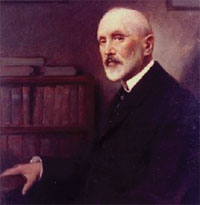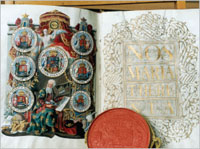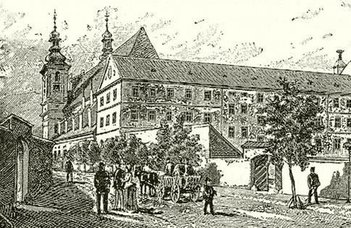
History
Brief History of ELTE
A modern university with 380 year old traditions
| 2021 |
Faculty of Economics founded from the Institute of Business Economics |
| 2019 |
CHARM-EU formed on the principles of the European Universities Initiative by the University of Barcelona, Trinity College Dublin, Utrecht University, University of Montpellier and ELTE |
| 2018 |
The Institute of Business Economics and the Berzsenyi Dániel Teacher Training Center are founded |
| 2017 | Savaria University Center was integrated into ELTE |
| 2016 |
Member of the Central European Leuven Strategic Alliance (CELSA) /Member of the LERU CE7 initiative |
|
2014 |
Member of Central European Network for Teaching and Research in Academic Liaison (CENTRAL) |
|
2013 |
Awarded the University of Excellence / Member of Agence Universitaire de la Francophonie (AUF) |
|
2012 |
Quality Award for International Cooperation |
|
2010 |
ELTE was awarded the title "research university" |
|
2006 |
Member of the European University Association (EUA) |
|
2003 |
The Faculty of Informatics, the Faculty of Education and Psychology, and the Faculty of Social Sciences were founded / Member of CEI University Network |
|
2000 |
The Faculty of Primary and Pre-School Education and the Bárczi Gusztáv Faculty of Special Needs Education were integrated into the University / Member of Utrecht Network |
|
1994 |
János Harsányi, ELTE alumnus was awarded the Nobel Memorial Prize in Economic Sciences |
|
1991 |
Member of Coimbra Group |
|
1990 |
Member of UNICA Network |
|
1983 |
Member of Danube Rectors' Conference |
|
1961 |
György Békésy, ELTE alumnus was awarded the Nobel Prize in Physiology and Medicine |
|
1957 |
Eötvös University Orchestra and Folk Dance Group were founded |
|
1951 |
The Medical Faculty (today: Semmelweis University) became an independent higher education institution |
|
1950 |
The University adopted the name of the world-renowned physicist Loránd Eötvös |
|
1949 |
The Faculty of Science became independent of the Faculty of Humanities |
| 1948 | ELTE Bartók Béla Choir was founded |
|
1943 |
György Hevesy, ELTE alumnus was awarded the Nobel Prize for Chemistry |
|
1937 |
Albert Szent-Györgyi, ELTE alumnus was awarded the Nobel Prize in Physiology and Medicine |
|
1905 |
Fülöp Lénárd, ELTE alumnus was awarded the Nobel Prize for Physics |
|
1900 |
The first Special Education Teacher Training Course, (predecessor of the Bárczi Gusztáv Faculty of Special Needs Education) in the world was founded |
| 1898 | The Budapest University Athletics Club (BEAC) was founded |
|
1896 |
Vilma Glücklich, the first female student was admitted to the University |
|
1872 |
Europe's first Teacher Training School, (predecessor of ELTE Trefort Ágoston Teacher Training School), was founded |
|
1869 |
The State Teacher Training Institution, (predecessor of the Faculty of Primary and Pre-School Education), was founded |
|
1860 |
Authorization of Hungarian as a language of education at the University |
|
1784 |
German becomes the main language of instruction instead of Latin |
|
1777 |
The University moved to Buda |
|
1769 |
The Medical Faculty was launched |
|
1667 |
The Faculty of Law was founded |
|
1635 |
Cardinal Péter Pázmány signs the founding documents of the University in Nagyszombat (today: Trnava, Slovakia). The first two faculties of the university were the Faculty of Humanities and the Faculty of Theology. |
 The predecessor of Eötvös Loránd University (ELTE) was founded in the rural town of Nagyszombat (today: Trnava, Slovakia) in 1635 by Cardinal Péter Pázmány, as a catholic university for teaching Theology and Philosophy. In 1770-1780, the University was transferred to Buda and later to Pest, and with the support of Maria Theresa, the Empress of Austria and Queen of Hungary, became the Royal Hungarian University.
The predecessor of Eötvös Loránd University (ELTE) was founded in the rural town of Nagyszombat (today: Trnava, Slovakia) in 1635 by Cardinal Péter Pázmány, as a catholic university for teaching Theology and Philosophy. In 1770-1780, the University was transferred to Buda and later to Pest, and with the support of Maria Theresa, the Empress of Austria and Queen of Hungary, became the Royal Hungarian University.
Over the following decades, new faculties were established to meet the expectations of a learned society. In the second half of the 19th century, the University developed into a centre of modern higher education in today's sense, covering nearly every scholarly field.
 In 1950 the university was reorganized and adopted its present name. It was named after one of its professors, the world-famous physicist, Loránd Eötvös.
In 1950 the university was reorganized and adopted its present name. It was named after one of its professors, the world-famous physicist, Loránd Eötvös.
Recently, a new campus has been built on the scenic banks of the Danube. This campus, Lágymányos Campus is now home to three faculties: Faculty of Informatics, Faculty of Science, and Faculty of Social Sciences.
Currently, the university has nine faculties: Economics, Education and Psychology, Humanities, Informatics, Law, Primary and Pre-School Education, Science, Social Sciences and the Bárczi Gusztáv Faculty of Special Needs Education.
 Eötvös Loránd University is internationally recognized and its programs are accredited by the Hungarian Accreditation Board. The diplomas issued by Eötvös Loránd University are acknowledged worldwide, and its course credits are transferable in all countries in the European Union.
Eötvös Loránd University is internationally recognized and its programs are accredited by the Hungarian Accreditation Board. The diplomas issued by Eötvös Loránd University are acknowledged worldwide, and its course credits are transferable in all countries in the European Union.
Over the last hundred years, Eötvös Loránd University (ELTE) has had many world famous scientists and four Nobel Prize laureates among its teachers and alumni. The current number of students enrolled yearly has reached 33,000, and there is an academic staff of 1,800 highly-qualified teachers and researchers.
Read more about the history of the university

